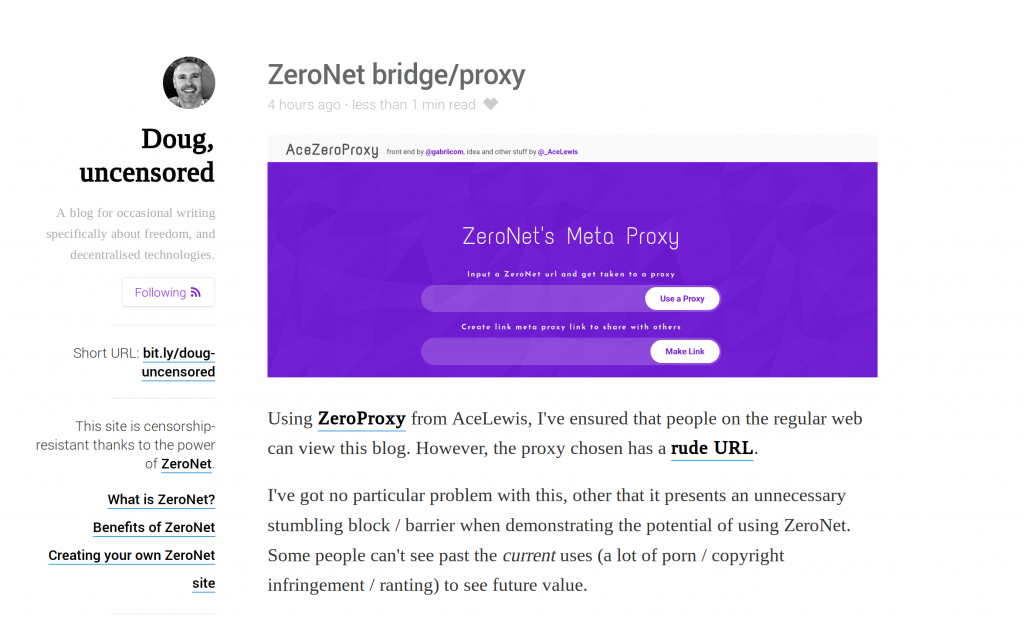Investing in decentralised crypto file storage

In October 2017, during the Catalonian independence referendum, I travelled to Barcelona to talk about decentralised technologies. It was perfect timing. Not only was I talking about technologies such as IPFS and ZeroNet, but they were being used to circumvent government blocks on sites listing places where people could vote.
As we saw with Parler and Amazon Web Services, the technology stack underneath apps can be used to take them down. That’s good if we’re talking about places for the alt-right and fascists to organise. But it’s not so good if the technology is used against us and the things we think are important.
That’s why I think there are two pinch points that have been coming into focus over the last decade:
- DNS
- File storage
The first of these is out of scope for this post but I continue to keep my eye on progress being made through, for example, the Brave browser having native support for Tor websites, and perhaps projects such as Namecoin becoming more mainstream.
It’s the second I want to discuss, because while control of DNS is largely in the control of governments, control of file storage (‘the cloud’) is largely in the hand of Big Tech. For example, I host many of my websites through Digital Ocean, but they, in turn, get their storage capacity through services provided by Amazon, Google, and Microsoft.
There are three particular technologies that I’ve had my eye on, ever since doing the initial research for MoodleNet back in early 2018:
- Filecoin — “a decentralized storage network designed to store humanity’s most valuable information”
- Sia — “decentralized storage for the post-cloud world”
- Storj — “decentralized cloud storage is here”
The reason I’m writing about them now, is that all three are cryptocurrencies I’ve invested a small amount of money in recently. Interestingly, they’re all taking slightly different approaches to the question of decentralised file storage, with each having useful pages explaining how they work (Filecoin, Sia, Storj).
One thing they have in common is that, a bit like people renting out their unused rooms via Airbnb, the idea is to take the world’s unused storage space, and make it available in a decentralised, trustless way.
The obvious next question to be asked, I guess, is to do with liability: if someone is trying to store something illegal and it happens to be stored on a device I own? Will I get prosecuted?
The Sia FAQ suggests not:
In the United States; hosts are considered safe from user submitted content under section 512 of the Digital Millennium Copyright Act. Storage providers, websites and ISPs (Internet Service Providers) are considered protected under 230(c)(1) of the Communications Decency Act. No cases in the US have specifically accused websites of CP. Section 230©(1) is considered a “safe harbor” but has never been tried in a court of law.
In the European union; hosts may be protected by Directive 2000/31/EC as long as they meet certain criteria.
I’ve used Bittorrent since I first found out about it, and in 2005 talked about it potentially revolutionising the way educators share resources. A few years later I was using Grouper to share gigabytes worth of resources with other teachers, before it was acquired by Sony. By 2013, I was experimenting with Bittorrent Sync, and even last year I was demonstrating how to seed torrents via the Internet Archive.
The reason I mention this is that I’ve been a fan of decentralised ways of sharing files for over 15 years now, and feel that we’ve really got to get away from the centralisation of the internet that’s been going on over the last decade. While we can’t wind the clock back, we can design easy-to-use services that make the default be decentralisation rather than centralisation.
So, yes, I’m putting my money where my mouth is with decentralised storage tech. I’m not sure which will end up being the most used, but I like the fact that, with Tardigrade, Storj has created a drop-in replacement for Amazon services which is not only cheaper, but decentralised and encrypted by default.
This post is Day 86 of my #100DaysToOffload challenge. Want to get involved? Find out more at 100daystooffload.com. Image via this awesome article on IPFS at Make Tech Easier


